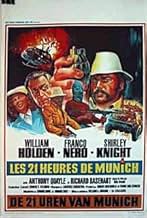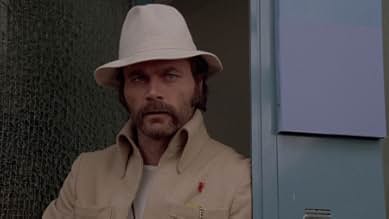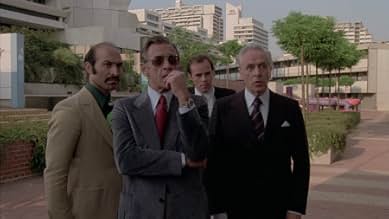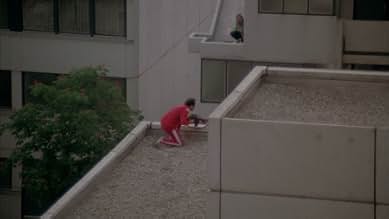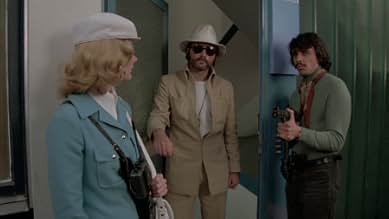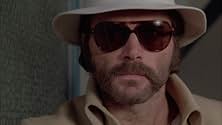IMDb RATING
6.3/10
1.3K
YOUR RATING
A dramatization of the incident in 1972 when Arab terrorists broke into the Olympic compound in Munich and murdered eleven Israeli athletes.A dramatization of the incident in 1972 when Arab terrorists broke into the Olympic compound in Munich and murdered eleven Israeli athletes.A dramatization of the incident in 1972 when Arab terrorists broke into the Olympic compound in Munich and murdered eleven Israeli athletes.
- Director
- Writers
- Stars
- Nominated for 2 Primetime Emmys
- 3 nominations total
Djamchid 'Jim' Soheili
- Touny
- (as Djamchid Soheili)
- Director
- Writers
- All cast & crew
- Production, box office & more at IMDbPro
Featured reviews
Released only one Olympic cycle after the actual events occurred during the 1972 Olympics, this film documents many of the behind-the-scenes events that happened while the world watched the horrible drama unfold. As a big fan of the Olympics, I was watching as news stories interrupted the peaceful competition to explain the unthinkable had happened.
Terrorists had invaded the Olympic compound--the ultimate symbol of peaceful coexistence--and killed Israeli athletes, taking others hostage as leverage to demand the release of comrades held in captivity. As a viewer, I vividly remember the shadowy image of a man on a balcony, a man who threatened the Olympic principles and the world at large, but somehow, though he was visible, was beyond the reach of retaliation. It was frustrating and tragic, but hostages' lives were in the balance.
This film was no doubt an attempt to fill in the blanks for many people who only saw those shadowy images from a distance. But is it more than a documentation? Is it a warning to the world or to those who would use terrorism for their political purposes? Or a tribute, perhaps, to those who did their best to tragic events that unfolded or those who were the victims of those who promote the initiation of violence (even against civilians) as a means to an end?
The narrative seems to bear few embellishments to the actual events of 1972. Hostage situations--with all of the accompanying negotiations and strategizing--are dramatic enough. William Holden, as chief of police, adequately portrays a man who will forever second guess his decisions. The leader of the terrorists (Franco Nero), becomes more than a shadowy figure as the film shows moments when his humanity is revealed. Presented with the option to walk away from further bloodshed, he says, "And have people think I am a coward?" When I first heard this line in 1976, I thought it referred to the world at large, but now I wonder if he was thinking about others who sympathized with his world view.
Terrorists had invaded the Olympic compound--the ultimate symbol of peaceful coexistence--and killed Israeli athletes, taking others hostage as leverage to demand the release of comrades held in captivity. As a viewer, I vividly remember the shadowy image of a man on a balcony, a man who threatened the Olympic principles and the world at large, but somehow, though he was visible, was beyond the reach of retaliation. It was frustrating and tragic, but hostages' lives were in the balance.
This film was no doubt an attempt to fill in the blanks for many people who only saw those shadowy images from a distance. But is it more than a documentation? Is it a warning to the world or to those who would use terrorism for their political purposes? Or a tribute, perhaps, to those who did their best to tragic events that unfolded or those who were the victims of those who promote the initiation of violence (even against civilians) as a means to an end?
The narrative seems to bear few embellishments to the actual events of 1972. Hostage situations--with all of the accompanying negotiations and strategizing--are dramatic enough. William Holden, as chief of police, adequately portrays a man who will forever second guess his decisions. The leader of the terrorists (Franco Nero), becomes more than a shadowy figure as the film shows moments when his humanity is revealed. Presented with the option to walk away from further bloodshed, he says, "And have people think I am a coward?" When I first heard this line in 1976, I thought it referred to the world at large, but now I wonder if he was thinking about others who sympathized with his world view.
Now, every time we see a terror related movie, we are currently reminded of the world we live in today. When watching this, considering this actually happened, makes it that more frightening. This is a tight solid well made doco drama, concerning the tragic events of the 1972 Olympic games in Munich, where a group of terrorists took an Israeli group of game's participants, hostage, in a desperate attempt, to release their fellow comrades in jail, where demands were met, and negotiations were played out, rather carefully, tightly, led by a Munich detective in charge (Holden, one of many splendid performances here) who doesn't take to blackmailing lightly. Leading the terrorist group, is the always brilliant and flawless Franco Nero, who in my opinion, is one of the greatest actors in history. Brought in to kind of lighten and mellow the situation, and play an emphasizing ear is a woman, a government official or someone (Knight- Endless Love) where she kind of forms a matey bond with Nero. When explaining his situation, you want to feel for Nero's character, as he's a much more humane terrorist, and normally not the monsters, these people are made out to be, though I don't know how much he and the real person depicted, varied, but I really don't think there wouldn't of been that much variation. Beefy Paul Smith (a Bud Spencer look alike), as one of the hostages, shows another lighter side to the bad guys he usually plays, which kind of put a spring in my step. Although this movie's falls short of the whole story which was depicted in that much longer film, Munich, this again is a solid and well made dramatization of those events, an engrossing watch, and at a couple of points, frightening, steered by great acting, particularly that of Knight and Nero.
The film does a good job of depicting the terrorist attack on Israeli athletes at the 1972 Olympics. Unlike "Munich" which only spends a few minutes dramatizing the terror attacks & spends the rest of the film on Mossad actions tracking down the terrorists, this film shows the horror of the terror attack.
A much better film on the subject is the documentary "One Day in September" (1999) which won an Oscar for best documentary. The film does a good job of showing the ineptitude of German police forces & the intransigence of the IOC, which would not suspend the games for even one day while the terrorists murdered athletes & held others hostage.
A much better film on the subject is the documentary "One Day in September" (1999) which won an Oscar for best documentary. The film does a good job of showing the ineptitude of German police forces & the intransigence of the IOC, which would not suspend the games for even one day while the terrorists murdered athletes & held others hostage.
Very well done film about the murders of the Israeli Olympic team members by terrorists. Gripping, heartbreaking, and a good job done by Bill Holden as the police inspector. Everyone involved does a stellar job. A great time capsule of the terrible 70's. See it!
A semi-documentary movie about the terrorist attack on the Israeli team at the Olympic Games at Munich 1972.
In opposite to later adaptations of the same historical event, "21 Hours at Munich" was shot on the original locations. However, it is a little bit less of a documentary than it seems at first, it does take a bit of creative freedom in the narration. Which has been criticized by some reviewers, but makes it a better movie after all. Excellent performances by William Holden as the police chief and Franco Nero as the terrorist leader, whose motivation is explained remarkably well. He is not just the one-dimensional Hollywood villain firing bullets in all directions. That was important to make the film believable, as well as the discussions between the politicians. Even it makes the movie quite wordy, the reasons why and when and how the police fights the terrorists are explained well. "21 Hours at Munich" is a movie you should watch, first for the tragic history that hopefully will never be repeated, second for its solid story telling and acting which is above the genre average.
In opposite to later adaptations of the same historical event, "21 Hours at Munich" was shot on the original locations. However, it is a little bit less of a documentary than it seems at first, it does take a bit of creative freedom in the narration. Which has been criticized by some reviewers, but makes it a better movie after all. Excellent performances by William Holden as the police chief and Franco Nero as the terrorist leader, whose motivation is explained remarkably well. He is not just the one-dimensional Hollywood villain firing bullets in all directions. That was important to make the film believable, as well as the discussions between the politicians. Even it makes the movie quite wordy, the reasons why and when and how the police fights the terrorists are explained well. "21 Hours at Munich" is a movie you should watch, first for the tragic history that hopefully will never be repeated, second for its solid story telling and acting which is above the genre average.
Did you know
- TriviaAlthough it's not mentioned in this movie, the terrorist also demanded the release of Andreas Baader and Ulrike Meinhof, founders of the German Red Army Faction, who were being held in German prisons.
- GoofsThe actress playing Golda Meir speaks English with a very thick German accent. The real Golda Meir grew up in Milwaukee, Wisconsin, and spoke English with a standard American accent.
- Quotes
Chief of Police Manfred Schreiber: [Shocked when the terrorists take the helicopter pilots prisoner] What the hell are they doing?
General Zvi Zamir: [Bitterly] They are Arab terrorists. They are breaking their word.
- ConnectionsFeatured in Prefontaine (1997)
- SoundtracksOsse Shalom
By Nurit Hirsch (as Nurit Hirsh)
Details
Contribute to this page
Suggest an edit or add missing content

